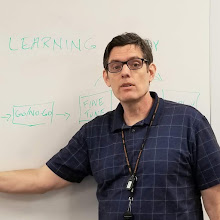Professional theologians typically operate within a standard background and paradigm. Their tools of the trade are humanistic: history, philosophy, and linguistics, with perhaps a sprinkling of psychology, sociology, and politics. They may occasionally borrow from science to gain an understanding of origins or of the boundary between the predictable and the miraculous, but rare indeed is the theologian who incorporates the scientific toolset into his or her craft.
When a leading particle physicist like John Polkinghorne dons the Anglican vestments and shows up at the theological party, then, he is pretty much guaranteed to produce some very thought-provoking insights. And when that physicist is also well-schooled in the theological craft, he communicates those insights ably to those not trained in science. Reading this compendium sharpened my understanding of the task of theology; free will and God's sovereignty; the role of Eucharist and Scripture; and a host of other topics.
The Task of Theology
Like the scientific community that he helped lead for decades, the author is committed to critical realism, which posits that our models of reality, while not reality itself, are increasingly useful for describing and exploring that reality. These models must be built from the ground up by making parsimonious inferences from data. Polkinghorne therefore sees theology as a model of the spiritual reality beyond our immediate sensations, and like any good model, it must carefully infer from the stream of data that nourishes it.Free Will and God's Sovereignty
Polkinghorne builds on the work of theologians like Jurgen Moltmann by incorporating scientific data and frameworks into the theological model. Unlike Bultmann, who imagined he was adapting theology to the scientific world by stripping away any hint of the miraculous, Polkinghorne proposes that the non-deterministic openness inherent to quantum physics and to chaos theory provides a way for God to determine an outcome (when He chooses to intervene) by inserting information, rather than matter-energy, into the machinery. Thus God can providentially guide the processes of nature without manifesting his intervention so radically that rationality would supplant faith. An open universe is also one in which God may choose to intervene miraculously, or even incarnationally, without violating the fabric of the created order.For those of you who are fans of scientific frameworks like quantum physics and chaos theory, you might hope that Polkinghorne provides a unified theory that mathematically marries high-order chaos to low-level quantum uncertainty, and so produces an elegant mathematics to undergird open theology. Alas, Polkinghorne insists that applying a recursive uncertainty algorithm fails because of "quantum fuzziness on length scales of the Compton wavelength and less." Polkinghorne does write well and clearly, but you'll be googling terms like Compton wavelength and Mandelbrot set from time to time as you read this book. But it's worth the effort!
The Role of Eucharist and Scripture
The author also extends his bottom-up thinking into more traditional theological subjects (Scripture, the historical Jesus, eschatology, etc.). In the same way that doing science is a community process, for example, the Eucharist is a community act for Polkinghorne. Likewise, he treats the Scripture as a scientist treats observations; it is not so much a collection of doctrines as it is a means to encounter God. I found Polkinghorne's reflections on traditional theological subjects to be just as challenging and edifying as his analysis of the science/theology relationship.Summary
I must commend editor Thomas Jay Oord for his skillful weaving of passages from the diverse Polkinghorne oeuvre into a cohesive whole. He has included a wide variety of material that I could not cover in this short review, such as:- The soul as a material reality and an information-bearing pattern, and how that relates to our eschatological hope
- Why physics does not support the claims of panentheism and process theology
- How quantum mechanics illuminates the doctrine of the dual nature of Christ
Future scientists in the faith community will no doubt follow in footsteps of Polkinghorne and a few others like him (e.g., Stanley Jaki and Francis Collins). Indeed, if Christianity is to survive in an increasingly scientific milieu, it must somehow make its peace with science. I do not doubt that it can do so. It has already made the leap from second temple Judaism to the Greco-Roman world; from the Greco-Roman world to medieval Europe; from there to an Enlightenment West, and from there to "two-thirds world" cultures and to the postmodern West. As more scientists join the theological discussion, many of Polkinghorne's explorations will be eclipsed, much as the interstate highway system has eclipsed the footpaths of native Americans and conquistadores. But Polkinghorne's writings point the way to our theological future, I am convinced, as we await the eschaton.
If you care about theology, this compendium of probing explorations is mandatory reading.
==========================
The publisher provided a review copy of the book in return for an honest review.

No comments:
Post a Comment